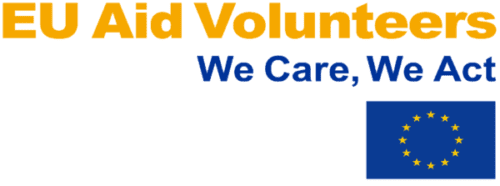Pawel, EU Aid Volunteer in Nepal
First months of my deployment in the Volunteers Initiative Nepal were definitely full of experience and challenges. They all allowed me to find myself in a new role, juxtapose my previous working experiences with the context of a developing country as well as learn a lot about Nepal itself. In this time, I also managed to identify the areas that I would like to work with and engage in some activities.
One of those activities was an external communication training that I have conducted for the VIN staff and some local and international volunteers. The main focus of the training was to learn how to use Facebook and other social media platforms efficiently and – perhaps even more important – more creatively. Despite the cold autumn season (which is still significantly warmer than this time of the year in Europe) over 15 participants of the training were simply on fire to improve their knowledge on the communication theories and their practical implementation. Suddenly, scary names like Aristotle Triangle or Pareto Principle became understandable and useful, while the Facebook algorithms stopped being some black magic known only for seasoned IT specialists and instead of that became tamed beasts that could be used for the profit of the organization.
What was important for me as a trainer is that the training was not only about learning the theories and that the participants actively took part in the practical exercises. We all had fun while imagining the people on the other side of the Facebeook, thinking about how we can reach them – or even what would be their favorite food. In case of French potential recipients – the choice was obviously cheese. Practical part also included a reflection of the previous experiences of the organization when it comes to the communication. Operating on the examples from VIN allowed everyone to think about the concrete solutions and ideas to use in the future. As the training was getting close to the end, the participates knew what styles of the communication to use and when and the trainer himself got the best possible review imaginable – complaints that the session was too short. Conducting this training allowed me to use some of my knowledge and experiences and apply them in the Nepali context. While it was challenging to prepare the presentation that would include Nepali brands and other examples from this cultural circle, it was definitely rewarding and made the training more accessible and relevant. It was also great to see the engagement of the participants in the practical exercises. Due to creativity of the team that took part in the session we all had a chance to not only learn – but also to exchange some new interesting ideas.

Sadly, huge area of Nepal faces more difficulties related to climate change due to the geographical reasons – every big infrastructural investment in the country requires disproportionally massive financial contributions, which the country simply cannot afford to cover. Nonetheless, the beauty of Okhaldhunga region might in the future serve as a magnet for international visitors, that might bring some sources of the revenue to the communities and families living in that area. Due to that – if you are reading this and planning trip to Nepal even as a tourist – please consider where to put your money and take into account the fact that opting for the less frequented places might in fact greatly enhance the lives of the most marginalized communities.
Et si c'était toi ?
Rendez-vous en réunion d'information !
Tous les mecredis à 11h en ligne

